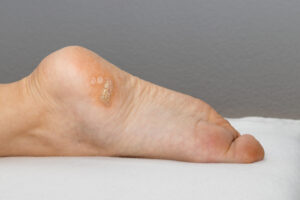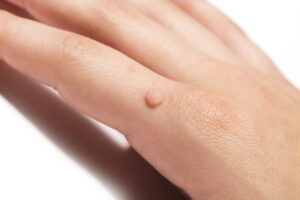
If you’re looking for Stockbridge, GA skin wart removal services by a professional dermatologist, chances are you might have some raised bumps on your skin that you have questions about. Skin warts are a common skin condition that affects millions of people every year. They are caused by the strains of the human papillomavirus (HPV) virus and can occur anywhere on the body, although they are most commonly found on the hands and feet. While skin warts are not usually dangerous, they can be unsightly and embarrassing. In this blog post, we will discuss what skin warts are, what causes them, the different treatment options available, and how to remove them safely and effectively.
What Is a Skin Wart?
Also just referred to as “warts,” skin warts are small, protruding growths on the skin that typically have a tough outer layer of skin around their raised surface. There are several different kinds of warts beyond the typical common wart, outlined below.
Plantar Warts

Typically found on the balls and heels of a person’s feet, plantar warts are typically flesh-colored lumps that may be brown or speckled with black, clotted blood vessels. They are likewise caused by HPV or a variant, often entering the foot through a small cut or weak area in the skin. They can last up to two years if left untreated.
Filiform Warts
These warts are known for growing extremely quickly and often appear spiky in appearance with “finger-like” growths protruding from them. They are typically found on the face around the nose, eyes, and mouth, which is why many people like to have them removed—though they typically are not painful and are not dangerous.
Flat Warts
These warts are typically found on the face or legs, especially in women. They are known for being smaller and flatter than a typical wart, and they tend to occur more prevalently in children and teenagers. Flat warts are generally more subtle in appearance and can go away on their own over the course of two months to two years. They are also caused by HPV.
Genital Warts
Caused by the Sexually Transmitted Infection (STI) genital HPV, genital warts can appear all over the pubic area, including around the anus or on the genitals. They tend to be flesh-colored, red, or pink and may be difficult to detect at first as they are typically quite small. They may become the source of itching and mild pain, though the real worry is that the virus will develop into cervical cancer—so if you suspect you may have contracted genital HPV (the most common STI in North America), contact your doctor immediately.
What Causes Skin Warts?
Warts are caused by the body’s autoimmune response to the HPV virus, which may enter the body through a cut or other types of damaged skin, such as eczema or even hang nails. Not everyone exposed to HPV will end up with warts, however, as individual immune systems react differently to the virus. Children and teenagers are more likely to develop warts as a response to contact with HPV, as their bodies have not had as much time to build up a defense against the virus. Likewise, folks with vulnerable immune systems—such as those living with psoriasis, HIV, or IVD—are more likely to develop warts after contracting the HPV virus, as their body is less able to fight it off.
Are Warts Contagious?
Yes! Warts are extremely contagious and are frequently passed by skin-to-skin contact. You can give yourself more warts by touching an affected area to other spots on your body, or even spread the virus to household items like shaving razors or even clothing. Warts are more likely to develop in broken, moist skin.
Do Skin Warts Hurt?
Most warts do not hurt—though some will, depending on their location, your activity, and the state of your body’s immune system. Some people have warts their whole lives, or years on end—and others eventually build up a resistance to them and outgrow them once they reach adulthood. Doctors still aren’t quite sure what causes some warts to stick around, or what determines if a wart will become painful.
If you have a raised bump on your skin that is quite painful, it is possible it is not a wart, and you should seek medical attention from a qualified dermatologist right away!
Can Skin Warts Become Cancerous?
Fortunately, most skin warts are not cancerous, though genital warts can be a warning sign for impending cervical cancer. The type of HPV that leads to cervical cancer in women is genital HPV—a different beast entirely than the kinds that cause most skin warts: HPV types 3, 10, 28, and 49.
What Is the Treatment for Skin Warts?
Depending on the type of wart, the client’s wishes, and the location of the wart in question, a dermatologist may recommend removal—or they may recommend waiting it out and letting it go away on its own. The benefit to doing the latter is that it may help improve the body’s autoimmune response to the HPV virus, making you resistant to developing more warts in the future. The downside to this approach is that in waiting for your wart to disappear, it may grow larger, multiply, or spread to other areas of the body. This is why some people who develop warts wish to have them removed as soon as they appear.

Different Ways to Remove Warts
While there are old wives’ tales about what causes warts (and some about home remedies for ways to remove them), most dermatologists today stick to four different methods of skin wart removal, listed as follows:
- Topical prescription creams or gels: Typically composed of glycolic acid, salicylic acid, or tretinoin, these topical medications work to peel the wart away by aggravating the skin and inciting the immune system’s response to heal itself. Some topical creams even include 5-Fluorouracil, a cancer drug used to stop unnecessary skin cell growth. Another popular topical drug is cantharidin, which causes a blister to form underneath the wart which, when dried, causes the wart to come away with the dead skin. This means of wart removal is common in children as the application does not hurt.
- Cryosurgery: This type of wart removal is reserved for common warts in adults or teenagers. During this process, the wart is removed by freezing it off with liquid nitrogen, which can cause discomfort and pain during the process. Cryosurgery is more effective after multiple visits and following up the procedure with a chemical peel treatment. It may also cause light spots on skin tones with more melanin.
- Electrosurgery: Removing a wart via electrosurgery is burning it away using a needle with an electric current running through it. This method is typically used for foot warts, filiform warts, and common warts. Some dermatologists also use a laser…but don’t worry! They numb the area first!
- Curettage or excision: During this method of wart removal, the area is numbed and the wart is either scraped away with a spoon-like instrument or cut out with a scalpel. This type of wart removal is generally reserved for adults.
If the above four methods don’t work, or even a combination of methods, some dermatologists will go as far as to inject the wart with medicines that will either boost your immune system so your body can better fight the HPV or stop infected cells from replicating. This is typically done as a last-ditch effort.
Stockbridge, GA Skin Wart Removal

While some warts can be upsetting for cosmetic reasons, others can become painful or, in the case of genital HPV, potentially develop into cervical cancer. If you suspect you have a wart, however, there’s no need to panic! Visit your local dermatologist for Stockbridge, GA skin wart removal and ask for their professional opinion on how to stop the spread of the virus. Remember, warts are contagious—so consider having yours removed by a professional to stop the transmission of the virus today!
Looking for Stockbridge, GA skin wart removal services by highly trained dermatologists? Contact National HealthCare Center today to make an appointment!

